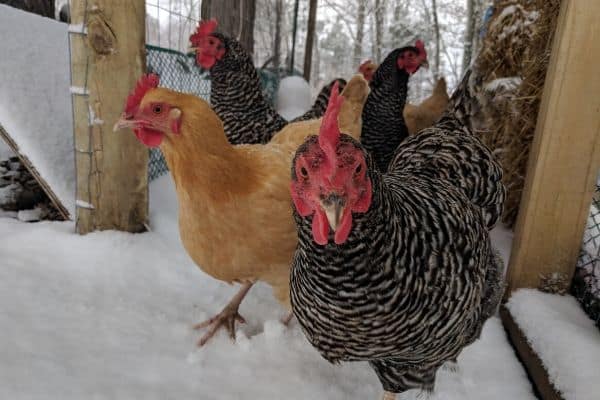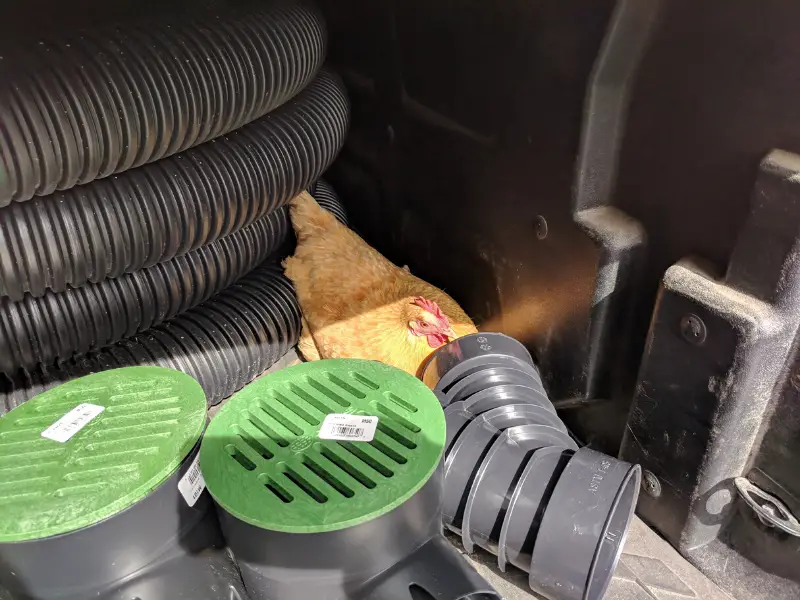As chicken owners it is our responsibility to protect our chickens from harm. There is no worse feeling than coming out to the coop in the morning to find a horrible murder scene with feathers, blood and carcasses strewn about the coop.
We should do all we can to ensure this doesn’t happen to our flocks. Protecting chickens from predators is accomplished at three different levels:
- Discourage predators from visiting your homestead
- Secure the coop and run to give the chickens a safe haven
- Active predator management when necessary
We’re going to take a more in-depth look at each of these three steps with strategies, tips and tricks for each. Chicken predators consist of many different types of critters including mammals, other birds, and reptiles. Let’s identify the the many different types of chicken predators based on what area of the world you happen to live.
Chicken Predators
North America
Whether you live in the city, suburbs, rural, or remote wilderness, North American chickens owners have many predation threats to worry about.
- domestic dogs – even the family dog if not trained and conditioned to resist the temptation.
- domestic cats – mostly a threat to younger birds, but a large farm cat could kill a full grown hen. Especially if she is sleeping or broody.
- coyotes – hardly ever seen, but very widespread. Very cunning and sneaky they usually hunt at night.
- foxes – if you don’t have coyotes around then you probably have foxes as coyotes will push foxes out of their territory. A lot smaller than a coyote and can squeeze through a small hole in the fence to get in and eat your hens.
- wolves – limited to remote wilderness areas, but hunger will push them onto homesteads for an easy catch.
- bobcats – around in greater numbers than you’d think, but rarely comes around people.
- lynx – limited to remote wilderness ares.
- raccoons – Probably the number 1 threat to chickens because they are very determined and resourceful. My biggest enemy on the homestead.
- possums – mean and nasty little critter will bite the heads off chickens.
- skunks – more of a threat to young chicks or eggs.
- weasels/minks – small bodies can fit through tight spaces.
- bears – doesn’t commonly go after chickens, but could easily break into any chicken coop if they wanted to.
- owls – will swoop down into the run and walk through the coop door if left open.
- hawks – daytime threat if chickens free-range.
- snakes – more of a threat to young chicks or eggs.
- rats – more of a threat to young chicks or eggs.
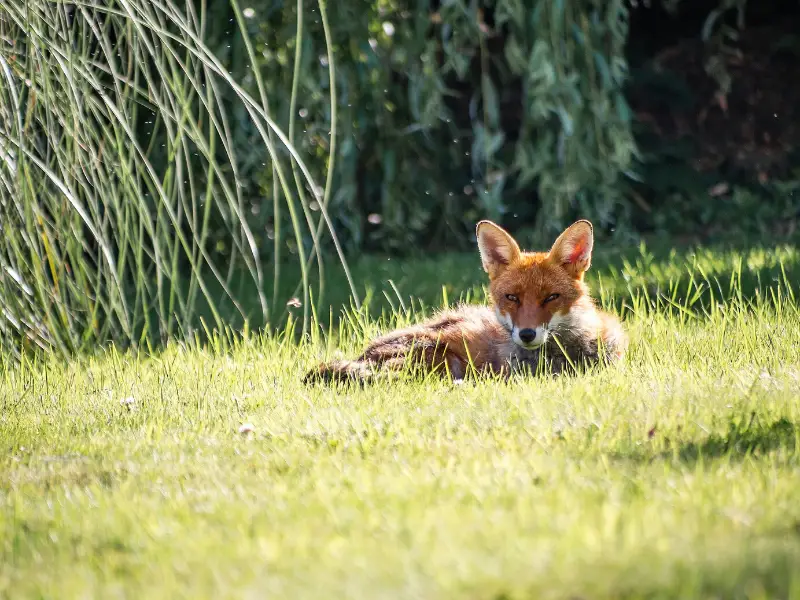
Central America
Mostly the same as North America with a few additions:
- Jaguars and other smaller jungle cats such as ocelots and margays
- Chupacabras – real or myth depending on who you ask, these creatures suck the blood from chickens leaving the carcasses intact.
The Rest of The World
There are predators anywhere in the world that people keep chickens. A lot of them are the same as in North America or at least very similar to them. For example there are different species of foxes that inhabit nearly every corner of the earth. All of them would take advantage of an easy chicken dinner if given the chance.
Avoid Predators All-together
At the top of the hierarchy of predator control is not having anything enticing for them to be attracted to your property in the first place. Or at least minimize those attractants because just owning livestock is an attractant in itself. Some things to consider to attract predators are food sources, shelter or hiding areas, and vermin that may be around the homestead.
Food sources is an easy one to get cleaned up so it’s not inviting. If you have any dog or cat food stored in an outbuilding it will attract critters such as raccoons and possums for sure. Secure this food in airtight containers or in buildings that are sealed up to not allow the odors of those foods to drift away off the homestead for a passerby to notice and come investigate.
Be careful of meat and food scraps thrown away in an outdoor garbage can. Not only is it a mess to clean up when a critter tears into it and spreads trash through the yard, but it also keeps them coming back looking for more and finding none the may start to eye up the chickens instead.
Same goes for any roadkill out in front of the homestead. A freshly killed deer will attract many critters to come investigate. In some areas the local road commission may come and take care of roadkill, but most of the time it will be up to the resident to either bury it or suffer the stench for the next few months. Another good reason to own a tractor with a loader and backhoe.
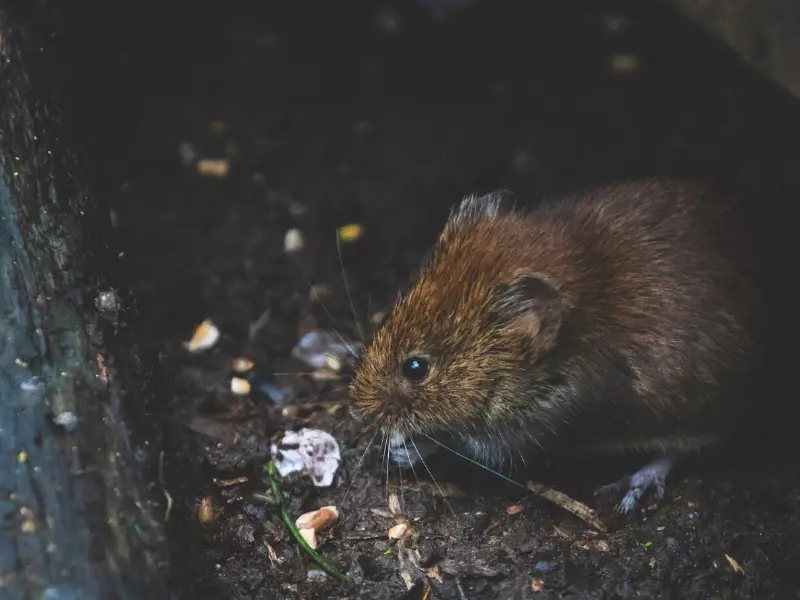
If you feed any livestock at all you’re bound to have vermin such as rats and mice move in looking for any uneaten food. This situation though should not be allowed to get out of control because even if the predators don’t come for the chickens they will come for the rodents. I’m not sure how delicate a predators taste buds are, but I know I’d much rather eat chicken than rat.
Brush piles, stacks of old lumber, junk machinery and other items like that are all great hiding places for predators to hang out and wait for and opportunity to snatch a chicken or two. Any of those hideouts as well as overgrown vegetation or even long grass that is located too close to the chicken coop is just asking for trouble from a predator.
Even an old wooden barn or shed may harbor an owl or a family of foxes or raccoons. Don’t get me wrong, old wooden structures on the farm are sometimes picturesque and give an nice vintage feel to the homestead, but they should be boarded up if safe to do so and checked regular for any sign of an occupant.
Coop Security
No matter how much preventative measures you take, there is always a chance a predator will show up anyway. Having a very secure chicken run and coop is imperative for the safety of your flock. There will still be dangers during the day if you allow your chickens to free-range, but at least at night you can have the peace of mind that they are safe and secure.
Our coop was broken into once by a family of raccoons and the entire flock of young hens were wiped out. I vowed to never let this happen again so I fixed up the coop to be as secure as Fort Knox. There has been evidence of a second attempt but they were unsuccessful and haven’t been back since.
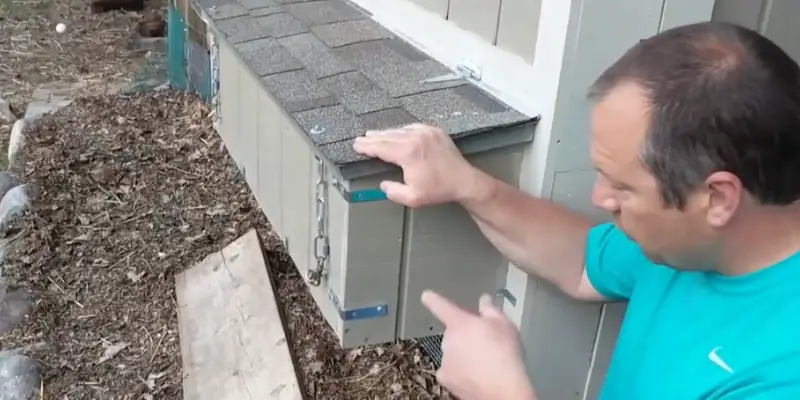
To secure the coop, I first secured any siding or boards that were just nailed on with either screws or added metal angle brackets to make sure there was not way to pry a board lose. I then used eye-bolts, chains and clasps to secure the lid to the nesting box. The small chicken door to the run slides in a track and is difficult to open unless pulled straight up by a cable that runs to the outside where we can open and close it easily. Lastly I put a latch on the large door way up high and made sure it is a tight fit that takes a lot of force to open it.
The run is made from garden fencing wrapped around pressure treated posts. The holes in the fence are 2″ by 4″ which is big enough for a raccoon to reach into or even for a rat to fit through. There is also a danger of something digging it’s way under the fence to get into the run. For these reasons, I used heavy-duty hardware cloth with 1/2″ holes around the entire coop. I folded it in half so it went up the fence a couple feet and then also embedded the other half in to the soil to inhibit digging.
To finish off the coop security, I covered then entire top of the run with bird netting to keep the owls and hawks out. I zip-tied the edges to the top of the fence to make it more difficult if a critter tried to climb up and over the fence. I tried to think like a hungry predator to be sure I am always one step ahead of them. Here’s a video playlist from our YouTube channel covering chicken predators.
One more technique that I don’t use but could also be an option it to put an electric fence around the perimeter of the coop. We have friends that use an electric fence around their raised garden beds to keep the rabbits and deer out and it works well for them. Utilizing electric fencing may not be feasible if you have young children that routinely visit the chickens.
Animals that Protect Chickens
There are definitely some animals to keep around the homestead to help protect your chickens against predators. Some will be very protective of the flock itself such as a rooster or a well trained guard dog. Others are just more or less protecting their own area by chasing away predators such as llamas and alpacas. Still others are great for sounding an alarm such as donkeys, geese and guinea fowl.
Predator Management
Doing all these things should keep most predators away, but sometimes it’s just not enough and you may get a persistent predator continuously trying to get your chickens. This requires taking predator management one step further by either live-trapping/relocating or using deadly force.
Live trapping is the first option if don’t have that killer instinct. Live traps like this one on Amazon are relatively inexpensive and pretty easy to use. Set it out near the coop or on a route a predator would use leading to the coop with a little bait inside. Check it every morning until you catch the culprit. The sketchy part is taking the snarling nasty critter in your vehicle to release it away from civilization. Wear thick leather gloves to avoid any possibility of getting scratched or bitten.
There are times when using lethal means is the only way to get rid of a predator. Before going this route be sure to know the game laws in your area and never target an endangered species. Two options to employ are setting traps that target the species you believe is responsible for causing damage, or using a shotgun or rifle and wait for the critter to show up. Using poison is just too risky I believe because of accidental ingestion by a family pet or other friendly animal.
Taking all these preventive and control measures into account should give your chickens an excellent chance of a long, healthy life on the homestead.


